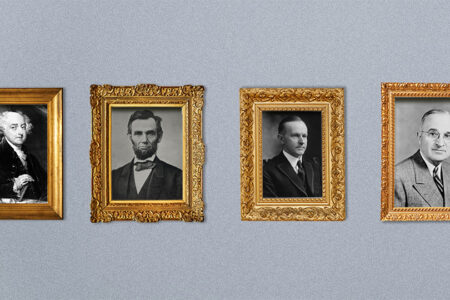The Message of the Gospel
(Interview begins at 13:08)
Struggling to reconcile God’s righteousness with his tormented condition, Job wanted a mediator.
As we read the book of Job today, we have the advantage of seeing what Job could not see: the spiritual challenge that took place in the heavenly realm. Through God’s Word, we have access to the much larger picture of what was happening in the life of this God-fearing man.
We also can see applications Job could not see—including the message of the gospel.
The book of Job, of course, doesn’t mention the substitutionary death, burial, and resurrection of Jesus Christ, which are the essence of the gospel (1 Cor. 15:1–4) and took place far into the future. But Job clearly wanted an intermediary so he could communicate with God: “Nor is there any mediator between us, who may lay his hand on us both” (Job 9:33). The word mediator literally means a judge or arbiter who could put his hands on the two parties in court to show he was taking them both under his jurisdiction and would bring justice.
To understand Job’s despair, it’s important to consider the context:
→ Job lost his family, his wealth, and his health. This situation was compounded by his wife telling him, “Do you still hold fast to your integrity? Curse God and die!” (2:9).
→ Intent on defending God as righteous, his friends Eliphaz and Bildad insisted Job was suffering due to sin in his life (4:7–9; 8:1–7). They were blind to the fact that there are purposes for suffering other than retribution.
→ Job felt hopeless and helpless with such counsel. Who was there to defend him? To whom could he appeal? Who would even listen to him? Job was struggling to reconcile God’s righteousness with his tormented condition.
Longing for an Advocate
With such counsel ringing in his ears, Job longed for someone to advocate for him but sensed the desire was futile: “How can a man be righteous before God? If one wished to contend with Him, he could not answer Him one time out of a thousand” (9:2–3).
Then he described God, who is invincible in wisdom and power and controls the earth and heavens. Who would dare go to court against such an opponent to attempt to prove one’s innocence? To further describe his sense of futility, he added, “If He goes by me, I do not see Him; if He moves past, I do not perceive Him; if He takes away, who can hinder Him? Who can say to Him, ‘What are You doing?’” (vv. 11–12).
Bible teacher Warren Wiersbe rightly suggested this scenario: “How can I meet God in court? (Job 9:14–35). In order to prove himself righteous, Job had to take God to court. But suppose God accepted the summons? What would Job say or do?”1
Here is where we are truly able to identify with Job. Though Job knew of no reason for God’s punishment and no sin needing confession, he asked the relevant question: “How can a man be righteous before God?” knowing God Himself is righteous (v. 2).
The apostle Paul quoted Psalm 14:3: “There is none righteous, no, not one” (Rom. 3:10). He had described a world that was given every opportunity to know God but “exchanged the truth of God for the lie, and worshiped and served the creature rather than the Creator, who is blessed forever. Amen” (1:25).
The whole world is guilty before God: “All have sinned and fall short of the glory of God” (3:23). We are born in sin, and any righteousness we think we possess God sees as “filthy rags” (Isa. 64:6). We have no ability to defend ourselves before God because we are certainly not innocent.
We desperately need a mediator—not one to plead our innocence but, rather, one who is righteous and able to reconcile us to God.
Our Righteous Mediator
Paul described such a Mediator in 1 Timothy 2:5–6: “For there is one God and one Mediator between God and men, the Man Christ Jesus, who gave Himself a ransom for all.”
As sinners, we are enemies of the Almighty and in need of being reconciled to Him. There is absolutely nothing we can do to change our condition or standing before a holy, righteous God:
For when we were still without strength, in due time Christ died for the ungodly. For scarcely for a righteous man will one die; yet perhaps for a good man someone would even dare to die. But God demonstrates His own love toward us, in that while we were still sinners, Christ died for us. Much more then, having now been justified by His blood, we shall be saved from wrath through Him. For if when we were enemies we were reconciled to God through the death of His Son, much more, having been reconciled, we shall be saved by His life. And not only that, but we also rejoice in God through our Lord Jesus Christ, through whom we have now received the reconciliation (Rom. 5:6–11).
Just as Job recognized God’s righteousness and longed for a mediator to plead his case, sinful humans desperately need a righteous mediator to reconcile them to God. Jesus’ sinless life and substitutionary death on our behalf met the righteous demands of a holy God, which we could never meet. Indeed, Jesus gave His life as a “ransom for many” (Mt. 20:28) and fully satisfied God’s righteous demands (1 Jn. 2:2).
When we acknowledge our sin and place our trust in Christ’s completed work on the cross, we can say, as Paul did: “[I may] be found in Him, not having my own righteousness, which is from the law, but that which is through faith in Christ, the righteousness which is from God by faith” (Phil. 3:9).
Our only hope lies in the fact that our holy and righteous God provided a righteous substitute for us so that we may be saved and declared righteous before Him.
Though Job was unable to reconcile his condition with the knowledge of God’s righteousness, he nevertheless was sure his Redeemer would one day declare his innocence: “For I know that my Redeemer lives, and He shall stand at last on the earth; and after my skin is destroyed, this I know, that in my flesh I shall see God” (Job 19:25–26).
Wiersbe noted, “Previously, Job had talked about his need for an umpire (Job 9:33–34) and an Advocate in heaven (16:19). Now he takes it a step further: his Redeemer will one day vindicate him, and Job will be there to witness it!”2
Job knew God would vindicate him when He judged the saints and finally meted out justice. The fact that Jesus, Israel’s Messiah, is that Redeemer is the clear message of the gospel.
Job didn’t have to wait until God’s final judgment because he was vindicated while he still lived: “And the LORD restored Job’s losses when he prayed for his friends. Indeed the LORD gave Job twice as much as he had before. After this Job lived one hundred and forty years, and saw his children and grandchildren for four generations. So Job died, old and full of days” (42:10, 16–17).
Our confidence today is that we, too, know that our Redeemer lives and that “He made Him who knew no sin to be sin for us, that we might become the righteousness of God in Him” (2 Cor. 5:21).
ENDNOTES
-
- Warren W. Wiersbe, Be Patient (Wheaton, IL: Victor Books, 1996), 39–40.
- Ibid., 75.









I thank God for FOI and the depth of research, compassion and addressing life’s challenges with Biblical hope, realistic big picture outlook, and solid theology.
Praying for all you in this ministry worldwide. Mitzi Brandon
I lost my son to an addiction and searched for answers. Somehow it felt like I could fix it if I only knew how this could have happened. I read Job and sermons on Job and it did help. I am glad we have Job to study. Now eight years out i still struggle with the whys and reasons but not as intensely. In the end there really are no answers that God speaks up and says to me, this is why. I have found no peace there. I have learned to rest in God’s love, with God as my father. Ive learned so much about obeying God, learning about Him, trusting Him. If I did anything to contribute to my son’s addiction, it doesnt help in any way to agonize over it. Giving my grief to God is my silver lining in my suffering. Some days i just must trust and believe no matter how I am feeling. God all through the bible has made good things out of bad situations and I pray the same will happen for us. People tell me I am a strong person but it is only because I stand on God’s word. I could not survive this any other way. ♥️🙏
Another thing Job did not have, the Holy Spirit living inside.
Thank you for the article, we have so much more insight than what Job had, yet at times I try to defend myself when I should have more faith in the one who does all things well.